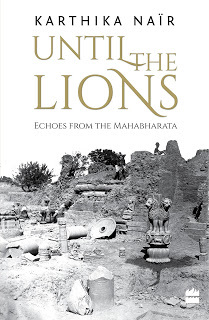Until the Lions: Echoes from the Mahabharata
 I don’t know how to react to this book by Karthika Naïr. A friend gave it to me recently, saying, as a poet, and a Mahabharata aficionado, I must read it. I did. I love the name. I understand the conceit – a feminist retelling of the greatest tale ever told (The title borrows from the famous African proverb –‘Until the lion has his or her own storyteller, the hunter will always have the best part of the story.’). I have no problems with it. Apart from the usual suspects, Naïr has amassed some less know characters, which is always nice. There are 19 voices, telling the tale from their point of view, complaining, accusing, judging, and making sense of the reality…
I don’t know how to react to this book by Karthika Naïr. A friend gave it to me recently, saying, as a poet, and a Mahabharata aficionado, I must read it. I did. I love the name. I understand the conceit – a feminist retelling of the greatest tale ever told (The title borrows from the famous African proverb –‘Until the lion has his or her own storyteller, the hunter will always have the best part of the story.’). I have no problems with it. Apart from the usual suspects, Naïr has amassed some less know characters, which is always nice. There are 19 voices, telling the tale from their point of view, complaining, accusing, judging, and making sense of the reality… There are some voices I really admired, like Ulupi mourning the beheading of Aravan. This may be because I have been thinking about the same story. Or, Jaratkaru, Astika’s mother, who would later be deified as Manasa in Eastern India; again, a character I have been thinking about a lot.
But as I read and reread some portions, I don’t know what to say. Some of the lines are pure brilliance. They leap out of the pages and hit you, in a good way, in a way good poetry can, and then there are lines and lines of banal meandering, just plain narrative in free verse, without a shred of poetry. How could this happen?
Simply, this is the circle I encountered. There are some brilliant lines, with some brilliant insight, brilliant images, a perfect rendering of the emotion, and you think, you have arrived at the right spot. And then, the narrative slips. It goes to plain storytelling. At one level, I understand. As far I can guess, the book was primarily written for a western audience, who would need to be clued in into the narrative, which is already disjoined. So, the storytelling fills the gap. But poetry it is not.
So, what do you do? I remember Bhartrihari, who wrote, be like a swan, which swims in the water, but drinks only the milk of it, not the dirt. So, this is what I did. I took a marker pen and underlined the lines I liked. It’s almost half of the book. The next time, I will read these underlined sentences and ignore the rest.
Oh, I like the cover, featuring, what I assume, a digging site at Sarnath during the Raj.
(And, I am remembering Amruta Patil’s Adi Parva, also published by HarperCollins. This is the best Mahabharata retelling in the recent years, by any standard.)
Published on March 11, 2016 04:18
No comments have been added yet.



